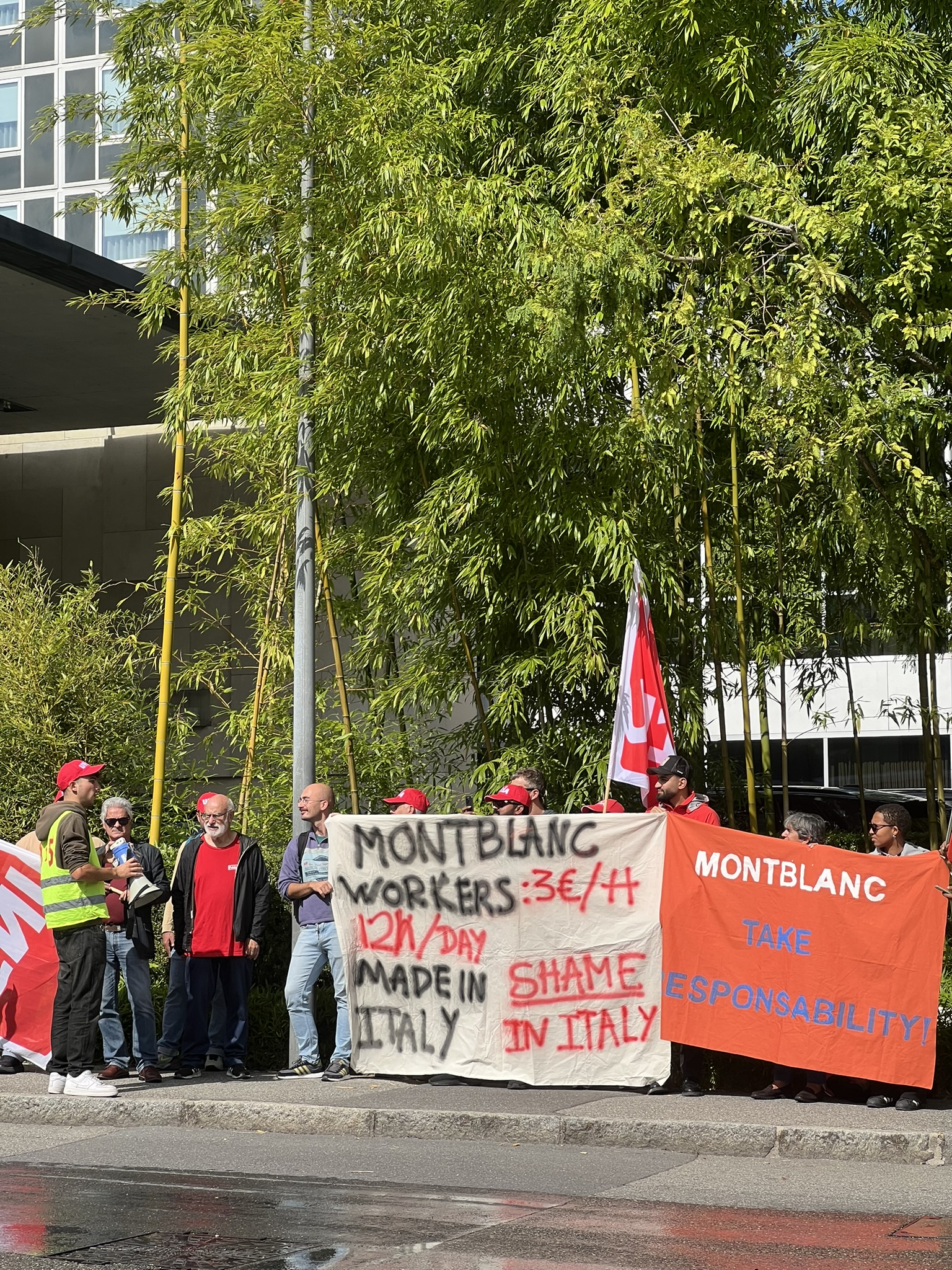Exploited factory workers from Tuscany protest at Richemont AGM in Geneva
At the Annual General Meeting of Swiss luxury group Richemont held today in Geneva, civil society organisations member of the international Clean Clothes Campaign network – Public Eye and Campagna Abiti Puliti – together with the SUDD Cobas trade union asked the management to resolve the case of the 6 Pakistani workers that have been dismissed in the Montblanc supply chain in Florence. After having been sent away by the police last year, members of SUDD Cobas together with two of the dismissed workers came back for a protest in front of the Hotel Intercontinental in Geneva where the AGM took place.
After years of working under inhumane conditions, 13 migrant workers in a factory producing leather accessories for Richemont-brand Montblanc reached an agreement with the support of local union SUDD Cobas that guaranteed them legal working conditions. Only a few weeks later Richemont terminated the contract with the factory, which eventually led to the lay-off of the workers.
Ali Hassan and Asghar Muhammad, migrant workers from Pakistan, were manufacturing luxury leather bags in a factory that produced for Richemont brand Montblanc, for years under illegal and exploitative conditions: They had to work up to 70 hours a week for about 3 euros per hour. They were not given any days off or offered the social protection guaranteed by law.
An intervention by the local union SUDD Cobas secured them regular working conditions in February 2023. About four weeks after signing the agreement, Pelletteria Richemont, the local branch of the corporation, terminated its contract with the factory. For Ali Hassan, Asghar Muhammad and their colleagues this meant that they lost their jobs. Instead of offering the workers alternative employment in the production for Richemont or compensating them for the damage suffered, Pelletteria Richemont sued representatives of SUDD Cobas. Public Eye reported on this.
On the occasion of this year's Richemont Annual General Meeting on 10 September, Ali Hassan and Asghar Muhammad travelled to Geneva together with representatives of SUDD Cobas. After having been stopped and sent away by the police last year during a spontaneous protest at the AGM of Richemont, they came back for an authorized protest this year.
20 people gathered in front of the Hotel Intercontinental. They held banners saying, “Made in Italy – Shame in Italy” and “Montblanc – Take Responsibility”. The protest was being organized by Public Eye, Campagna Abiti Puliti, the Clean Clothes Campaign network (CCC) and supported by several other organisations.
At the AGM Public Eye and SUDD Cobas took the floor to bring up the case and ask Richemont management to take up negotiations with the union to solve it. Board director Johann Rupert personally answered the question, denying all allegations and Richemont’s responsibility. Florian Blumer from Public Eye said, “We have solid proves for all the allegations and we will continue to demand Richemont to solve the case and to set up effective measures that ensure legal working conditions in their supply chain.”
After leaving the Hotel to join the protest, Francesca Ciuffi (organizer at SUDD Cobas) commented: “It was quite intense to sit next to some of those who, after today’s AGM, will earn in dividends what a Montblanc worker would earn in just under 800 years of work. But it was mostly very powerful to make the voice of the Montblanc workers heard precisely by those same people. Their answers were not satisfactory, but we won’t give up, and there is always space for them to reconsider.”
Deborah Lucchetti, national coordinator of Campagna Abiti Puliti – Clean Clothes Campaign Italian section – who has been dealing with cases like this for years, stated: “Companies cannot pass the burden of cost-cutting onto workers to increase their profits. Cases such as those of the Pakistani workers in Montblanc’s supply chain in Prato show that exploitation is widespread even in the luxury sector. If companies do not ensure decent conditions, the State must step in by enforcing the EU due diligence directive. Voluntary agreements are not enough: binding rules are needed.”
